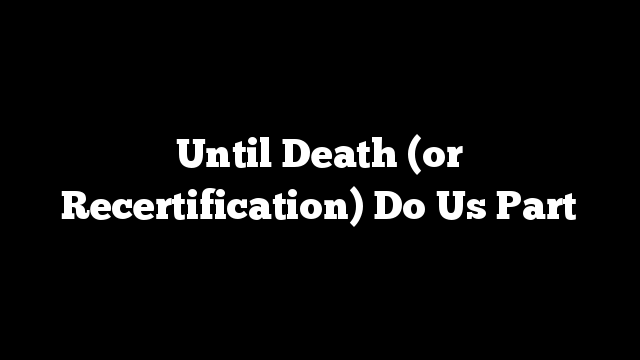
By RICHARD DUSZAK, MD
The online membership forum of the Society of Interventional Radiology (SIR) blew up this week in response to an email announcement by the American Board of Radiology (ABR) that it will effectively be doing away with lifetime diagnostic radiology certificates for interventionalists whose original certificates pre-dated the introduction of time-limited certificates. Interventionalists were given two choices:
1. You can keep your lifetime diagnostic certificate if you give up your (earned) interventional subspecialty certification, or
2. You can keep your interventional certification, if you give up your lifetime diagnostic certification.
Talk about choice.
Keeping your lifetime certificate in diagnostic radiology and your time-limited certificate in interventional radiology—the option I chose 20 years ago when I voluntarily became one of the ABR’s new interventional certification guinea pigs—is no longer an option.
Interventional radiologists are trained in diagnostic radiology, just as interventional cardiologists are trained in general cardiology, and many interventionalists still interpret imaging – indeed it’s hard not to, if you’re using imaging to reach organs.
This latest top down mandate by the ABR is another example of the ongoing proclamations of the many American Board of Medical Specialties (ABMS) member boards that have infuriated so many well-meaning practicing physicians. It is yet another step in the insidious push by the ABMS to force physicians into increasingly onerous Maintenance of Certification (MOC) programs. Coincidentally (or not), these have turned out to be quite profitable for its member boards, whose asset war chests have grown quite handsomely—all funded by a new stream of MOC dollars from practicing physicians.
I’m not an ABR hater. In fact, I’m a staunch supporter of the board certification — so much so that the ABR recently recognized me with a Volunteer Service Award. I have served for many years as an oral examiner in both diagnostic and interventional radiology, on the ABR’s non-interpretive skills committee, and regularly on its Angoff Panel (a panel which tests the test) before each year’s electronic examinations. They’re time-consuming commitments, but ones that I view as my civic duty. Physicians are held to a very high standard—and rightfully so—and need to continually earn public trust. That’s the reason that I—like many other interventional radiologists—am upset. Our collective commitments to the public and to our profession only work if we can trust our boards.
The ABR proclaims in its volunteer manual that public trust is the first pillar of our profession. Public trust is, in fact, prioritized so much that the ABR includes professionalism as one of its six key MOC competencies—and something that’s now part of all of our electronic examinations. But, as reflected in the online comments of a number of interventional radiologists (e.g., “They cannot be trusted. Period.”), the ABR is failing the examination of real life—and losing the trust of its own diplomates.
When an organization listing public trust as its first professional pillar grants lifetime certification, it is not selling a widget. It is entering a covenant with that diplomate, who buys into ABR’s and ABMS’s word that lifetime means lifetime.
Almost 30 years ago, I entered another lifetime covenant, when I said “until death do us part.” If I told my wife that I’m no longer honoring that lifetime covenant, and just want to stay friends and continue our relationship in a transactional manner, conditional upon her meeting whatever “Maintenance of Companionship” requirements I decided arbitrarily, she would kick me to the curb. And, rightfully so. Telling her that maybe someday down the road, if she asks nicely, I’ll reinstitute that lifetime covenant would probably infuriate her even more. Based on several dozens of posts (and still climbing) on the SIR’s forum, that’s how many respected interventionalists are interpreting the ABR’s latest missive—as emotionally and passionately as victims of cheating spouses.
But, there’s a silver lining to this cloud. With my lifetime certification partner telling me that her over two-decade “until death do us part” promise secretly came with an asterisk, I am now free to explore other certification partners.For the last two years, I’ve watched closely the growth—and growing acceptance—of the National Board of Physicians and Surgeons (NBPAS). Its Board of Trustees includes luminary thought leaders like Eric Topol and Michael Gibson with whom I’ve connected on social media. They, and their trustee colleagues, are forward thinking physicians who have chosen to prioritize patients, physicians, and integrity over ABMS bureaucracy. Shortly after receiving notification of “we changed the rules—take it or leave it” choices from the ABR, I applied for board recertification from NBPAS. I look forward to continuing my conversation with their leadership about how competition and transparency in the board marketplace can make board certification better for all of us—in the radiology community and beyond.
Public trust isn’t proclaimed. It is earned. If physicians can’t trust their boards, how can we expect the public to trust them?
About the author:
Richard Duszak, Jr., MD (@RichDuszak) is Professor and Vice Chair of Radiology at Emory University and Associate Editor of the Journal of the American College of Radiology.
